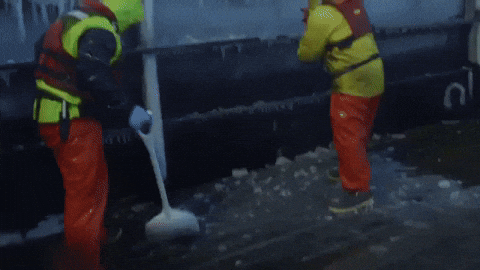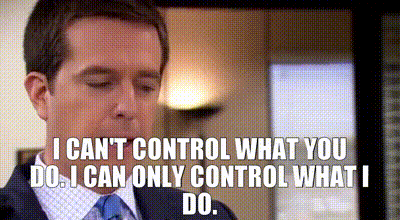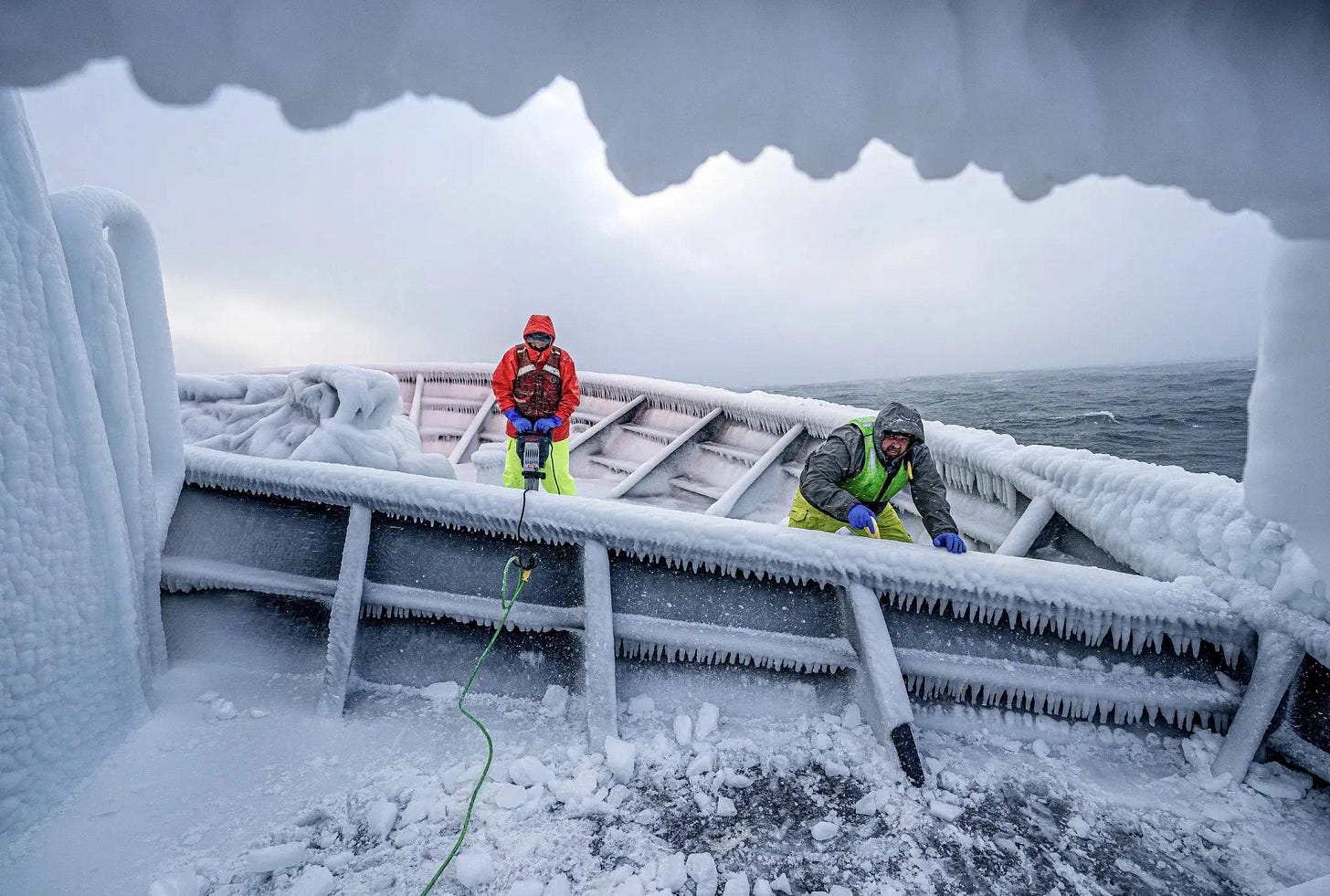A time existed in my life where I watched a lot of Deadliest Catch, and I hope there’s another one in my future. The bluest-collared job I’ve had involved chucking choose-and-cut Christmas trees onto a trailer pulled by a tractor and then tying them onto the roofs of people’s cars. That was nearly 30 years ago, but when I smell diesel, I still think of Christmas. Since then, my jobs have almost always had me indoors and my kids like to tell me when I “smell like outside.”
The Deadliest Catch guys hit another level of intensity. Danger, drama, and bad dialogue all make the show great. The days are exhausting, the work is dangerous, and the characters become endearing. Most kids who have seen Cars 2 don’t even realize that Captain Sig is right there at the beginning.
But one of my favorite leadership lessons about pursuing relationships comes from the heart of that late winter Opilio crab season, as the weather gets the coldest and the elements become the most dangerous.
As winter storms threaten crews on the Bering Sea, the boats are buffeted by the waves and get sprayed with light mist that freezes on contact. Not much at first—but each second, each minute, each hour left unaddressed, adds tens of thousands of pounds to the boat. In the clip above, the captain estimates 50 to 80 thousand additional pounds are weighing the boat down.
As the boat takes on ice, it starts to list—leaning from side to side, having a harder time recovering, and making even easy moves more dangerous. Without intervention, you run the risk of capsizing.
Taking on Ice
Every relationship takes on ice over time—this outcome is inevitable. Not only is our world plagued with external threats which cause us to doubt if others are for us, but we also deal with internal struggles of anger, fear, and the constant worry that we aren’t good enough for people to like us.
The accumulation starts small and appears insignificant, falling squarely into the “NBD” category.
Your co-worker didn’t invite you to lunch like he usually does. “No big deal,” you want to think. “But I wonder if the way I talked to him in the meeting earlier this week has him doubting me. Crap.”
You text a friend your enthusiasm about your new job. She replies with “Cool” and leaves off an exclamation point. Now you wonder what you did to get such a tepid response. Who leaves off exclamation points?!?!
You are left out of a closed-door meeting that you feel you should be invited into. You can’t help but wonder “What did I do?”
These are small offenses, if they are offenses at all. You don’t know until you investigate, but wanting to assume the best (or fearing you’ll hear the worst), you don’t do anything. Then another mix-up happens that you don’t address and another few millimeters of ice show up. A few months go by and two more offenses happen. Now you’re at an inch or two of ice.
At this point it is safe to say you’re listing. Even normal conversations are hard. Every motive starts to be questioned. The amount of time these relationships are spending rent-free in your head is taking a psychological toll.
I’ve done this enough times in my life as a leader to know the feeling.
Maybe you can relate—or maybe you’ve been knocked over by the elements.
You’re Probably Not Misreading It
Watch the video referenced above and you’ll hear one of the deckhands say, “We waited too long.” That’s often how I’ve seen it go with relationships of all kinds. Rather than have an easy conversation with almost no ice affecting the relationship, we start wondering if we should do something at about the two-inch mark. By that time, we’ve got some serious work to do—assuming the relationship can make it.
If you think there’s an issue to address, there probably is.
Over ten years ago I was working at my church and settling into a new role. All eyes were on the young guy—and those eyes were all older than me. I was trying to learn how to lead while actually having to be in the leadership seat I was learning.
One man and I went to lunch early on to try and get to know one another a little better.
“Hans, there was a time one morning where I looked at you and you looked at me, but you really looked right past me—like I wasn’t even there.”
I honestly did not remember that interaction, but based on his retelling, that appears par for the course. (If you’re reading this and you know me, you might’ve been the recipient of a blank stare a time or two as well. You can commiserate.)
You might think this is an unnecessary question to ask—maybe even petty. I’d disagree. Relationships need constant maintenance. None of them coast without ever taking on ice.
What my action did—as insignificant as it might’ve been—was put just a little bit of ice on the decks. This man wanted to knock it off right then and there. He wanted to clarify the experience and reset the relationship.
That type of engagement took maturity, and I’ve never forgotten it.
That’s what leaders should do.
Knocking Off the Ice
Leaders need to run toward these relational problems, not away from them, because the elements are often hostile. The sooner we can start attacking the problem, the better our organizations will be.
Who is pulling away from you or from others in your life that you can tell is drifting?
What small infraction have you done or has someone done to you that you can address right now?
Which relationships are unsteady right now? What’s the next move to knock just a little bit of ice off?
Relational management is one of the most difficult and satisfying feats you will ever accomplish. I must constantly check in with people to be sure we’re good, and many others I work with and around do the same for me. It’s a necessary part of life that we can’t neglect as leaders.
The worst case scenario in all of this? You were a little oversensitive and you bring up an insignificant interaction. But even when you bring it up, the other person sees how they’re coming off and can improve. (Of course, there’s always the risk that the person you confront won’t be honest, and nothing gets addressed. But you can’t control their response—only your own willingness to knock the ice off the deck.)
The best case scenario? You get to develop a deeper and better relationship with someone.
So what ice do you need to knock off?
More from my posts on trust and relationships:






